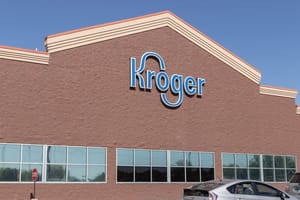SPOTLIGHT ON SERVICE
Underscoring service in the supermarket meat department pays off. Meat cutters, newly nudged into the limelight and often newly trained to engage customers offer a benefit that keeps meat sales growing even in the face of rising prices, retailers said. They see the service meat department as an information center, and the ultimate place to seal customer loyalty. Some also said it's a great place to
August 22, 2011
ROSEANNE HARPER
Underscoring service in the supermarket meat department pays off.
Meat cutters, newly nudged into the limelight — and often newly trained to engage customers — offer a benefit that keeps meat sales growing even in the face of rising prices, retailers said.
They see the service meat department as an information center, and the ultimate place to seal customer loyalty. Some also said it's a great place to sell customers up, and promote across departments.
“Given that there is so much case-ready meat, having a service meat counter with a butcher can become a real point of differentiation for a retailer who still has those assets,” said Neil Stern, senior partner, McMillan Doolittle, Chicago.
Indeed, for many independents, service counters have become a crucial point of difference with their larger competitors.
“For an independent operator in a chain environment, [full-service meat] is a necessary point of differentiation,” said Gale Lasko, general manager of five-unit Lamb's Thriftway, Wilsonville, Ore.
“We believe there's a difference between selling and serving,” he added. “We sell meat from our self-service cases. Customers usually know what to do with what they pick up from there. But the service meat counter — where we have a different variety of meats — gives us an opportunity to give them service.”
Lasko added that all five of Lamb's units have full-service meat departments.
“It's in full service that we have the restaurant-quality cuts and all-natural beef and value-added items,” he said.
“There, we have marinated meats and kabobs, for instance. We can talk to customers about the product, the meal they're going to prepare and make suggestions,” Lasko said. Cooking advice can also help drive traffic to other departments if associates suggest a wine pairing or a side dish, for example.
Lasko, like other retailers SN spoke with, said Lamb's full-service meat departments held up well during the recession. He theorized that customers were able to buy high-quality meats like steak or rack of lamb for much less money than if they had eaten such items in a restaurant.
“In such a cut, cut, gloom, gloom economy, customers downgraded in other departments, but treated themselves to a good meat,” Lasko said.
That's exactly where the meat cutters and knowledgeable associates in a full-service department can be of help. Customers pay a premium price for a prime rib roast or a rack of lamb and they don't want to ruin it.
Large chains are launching marketing efforts to reintroduce shoppers to their service counters as well.
Winn-Dixie Stores currently is emphasizing its service meat departments via its “Your Neighborhood Butcher” program launched last year. Indeed, the program is a major component of the chain's “transformational” remodels, said Hunter Robinson, spokesman for the 484-unit, Jacksonville, Fla.-based chain.
“We have about 4,000 butchers who did go through customer service training and are encouraged to engage our guests,” Robinson said.
He added that signs calling attention to Your Neighborhood Butcher have been placed throughout stores' meat departments, and meat associates display the Neighborhood Butcher brand on their aprons and hats.
Winn-Dixie is not new to service counters in meat and seafood departments. About 140 of the company's locations already have full-service meat counters with trained butchers, and the Neighborhood Butcher program is currently being rolled out in remodels.
But, with customers preparing more meals at home, and with many shoppers looking for a more personal touch with their shopping experience, this program helps emphasize the role that these professionals play at each store. The updated training, meanwhile, has helped make customer service efforts more proactive.
“The program has not changed anything about the structure of the meat departments or the layout,” said Robinson. The main difference is the butchers are even more available to help guests with custom cuts, meal solutions and recipe advice.”
Meanwhile, other large supermarket chains in the Southeast acknowledged that their service meat departments are a boon in a very competitive market.
“We believe service in the meat departments gives us a competitive edge,” said Maria Brous, spokeswoman for Lakeland, Fla.-based Publix Super Markets.
“Many [retailers] in our market have closed their full-service counters or they limit the hours of operation.”
Brous pointed out that Publix operates full-service meat counters in all 1,038 of its locations and keeps them open during stores' hours of operation.
Of course, even if they do have full-service departments, most supermarkets also have long displays of self-service meats that offer convenience and value to the customer. And even there, some companies are letting their customers know, via associates, signage, ads or public address systems, that the packaged meats in their self-service sections are cut and wrapped in-store, and that meat chosen from the self-service case can be cut or packaged differently, for example, for freezing, at the service counter.
Southern Family Markets, Birmingham, Ala., a 59-unit company that operates under Bruno's, Food World, Piggly Wiggly and Southern Family Markets banners, has its own definition of full-service.
“Since in most of our stores we cut and wrap the meat in-store, we feel that our stores are full-service even though they don't all have the traditional full-service meat cases,” said Carey Otwell, the company's meat and seafood director.
While the meat is merchandised in self-service cases, meat cutters make their presence known in the self-service aisle, stocking and checking products, and offering their help to customers.
“We do custom cuts and packages all the time and we encourage the consumer to ask and we will cut any [meat] to their liking.”
For larger chains, full-service departments may give them an added advantage, but for many independents, a full-service meat counter often means survival.
“We wouldn't be here [in this competitive environment] if we didn't have full-service meat, and excellent service in all our departments,” said an owner of several specialty stores in southern Florida.
Such is probably true of most independents located in highly competitive markets where they're surrounded by the likes of Albertsons, Fred Meyer and Safeway.
Officials at another independent, Sendik's Food Markets, Milwaukee, view their full-service meat departments as an important way to communicate with customers.
“It's good to be able to wait on customers because a lot of them need help,” Kevin Kelly, meat and seafood director for Sendik's, told SN in an earlier interview.
“They see wonderful ideas on cooking shows, but when they go to apply what they saw, they sometimes get lost and need a little guidance. That's where we come in.”
Scott Severs, meat operations manager at Jungle Jim's International Market in Fairfield, Ohio, agreed.
“Now that The Food Channel is telling people they can make their own bacon, we have people asking for pork bellies, but they do need some help,” Severs said.
“Or they buy a French rack of lamb, and they want to know how to cook it.”
Severs sees the service meat counter not only as an information center, but also one of the best places in the store for face-to-face contact with customers.
Like most others who have a staff of meat cutters, Jungle Jim's, with 12 butchers, cuts and wraps the meat sold from its self-service cases as well as at the service counter.
“Customers all the time bring self-service items up and want them trimmed, or cut a different way,” he said.
“We try to go one step beyond what a customer would expect of us. For instance, if they bring me a tenderloin to cut into steaks, we grind up the trim, and put that in the package, too. When they ask what's that, we tell them it's the trimmings from their tenderloin, freshly ground.”
And, to facilitate contact with shoppers, the department also does regular demos on weekends.
“We usually demo something we make in-house. We make our own sausage, for example, and we have a homemade meatloaf, so we'd be apt to demo them,” Severs said. “This weekend though, we're demoing brats. It is grilling season, and they're great for grilling.”
About the Author
You May Also Like




